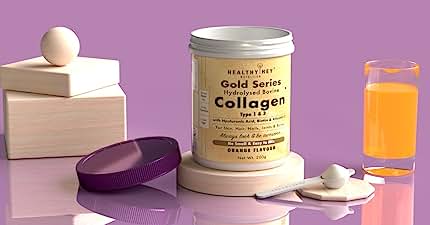The Truth Unveiled: Do Collagen Supplements Really Work?


Introduction
In today’s health and wellness market, collagen supplements have become the talk of the town. Promising to enhance skin elasticity, promote joint health, and improve overall vitality, these supplements have gained immense popularity. But amidst the marketing hype, it’s crucial to examine the evidence and address the burning question: Do collagen supplements really work?
Join us on a journey to unravel the truth behind these sought-after supplements and separate fact from fiction. We’ll delve into scientific research, explore customer experiences, and consult experts to provide you with a comprehensive understanding of the effectiveness of collagen supplements.
Table of Contents
The Science Behind Collagen
To truly understand the effectiveness of collagen supplements, it’s essential to delve into the science behind collagen itself. Collagen is the most abundant protein in the human body, accounting for approximately 25 to 35 percent of the body’s total protein content. It plays a vital role in maintaining the structural integrity of various tissues, including the skin, bones, tendons, and ligaments.
Collagen is composed of amino acids, primarily glycine, proline, and hydroxyproline, which form a unique triple helix structure. This structure provides strength, flexibility, and elasticity to the connective tissues, ensuring their proper function and resilience.
As we age, collagen production naturally declines, leading to visible signs of aging, such as wrinkles, sagging skin, and joint discomfort. Environmental factors such as sun exposure, pollution, and lifestyle choices like smoking can further accelerate collagen breakdown.
Collagen supplements aim to address this natural decline by providing the body with exogenous sources of collagen. These supplements typically contain collagen derived from sources like bovine (cow), porcine (pig), or marine (fish) collagen. The collagen is broken down into smaller peptide chains to enhance absorption and bioavailability.
But does consuming collagen orally through supplements actually lead to increased collagen levels in the body? Let’s explore the scientific research to find out.
How Collagen Supplements Work

Collagen supplements have gained popularity due to their potential to improve various aspects of health, including skin appearance, joint function, and hair and nail strength. Understanding how these supplements work can shed light on their potential effectiveness. Let’s delve into the mechanisms behind collagen supplementation:
1. Boosting Collagen Levels
The primary goal of collagen supplements is to increase the body’s collagen levels. Collagen, as mentioned earlier, is a vital protein responsible for maintaining the structure and integrity of our skin, bones, tendons, and ligaments. By supplying additional collagen through supplements, the aim is to replenish the body’s stores and support its natural processes.
- Bovine Collagen: Collagen derived from bovine sources, such as cows, is commonly used in supplements. Bovine collagen is rich in type I and type III collagen, which are crucial for skin health and elasticity. It is typically hydrolyzed, meaning it is broken down into smaller peptides for better absorption.
- Marine Collagen: Another popular source of collagen is marine collagen obtained from fish, usually fish skin or scales. Marine collagen is predominantly composed of type I collagen, which is also beneficial for skin health. It is often hydrolyzed for enhanced bioavailability.
- Porcine Collagen: Collagen sourced from pigs, known as porcine collagen, is less common but still used in some supplements. It contains a mix of type I and type III collagen.
2. Amino Acid Composition
Collagen is made up of various amino acids, such as glycine, proline, and hydroxyproline. These amino acids play essential roles in collagen synthesis and overall protein metabolism in the body. When you consume collagen supplements, you provide your body with a concentrated source of these amino acids, which are the building blocks for collagen production.
3. Absorption and Distribution
To be effective, collagen supplements need to be absorbed and distributed efficiently throughout the body. The hydrolyzed form of collagen found in many supplements undergoes a process that breaks it down into smaller peptides, making it easier for the body to absorb and utilize.
- Bioavailability: Bioavailability refers to the degree and rate at which a substance is absorbed and available for use in the body. The hydrolyzed collagen peptides in supplements have been shown to have high bioavailability, allowing them to be efficiently absorbed into the bloodstream.
- Targeted Delivery: Once absorbed, the collagen peptides are transported to various tissues where collagen is needed, such as the skin, joints, and bones. Although the exact mechanism of how collagen is distributed throughout the body is still being studied, researchers believe that collagen peptides may stimulate the production of collagen in specific target tissues.
4. Stimulating Collagen Synthesis
Collagen supplements may also stimulate the body’s natural collagen synthesis processes. Studies suggest that certain amino acids present in collagen, particularly glycine and proline, can act as precursors for collagen production. By providing an abundant supply of these amino acids, collagen supplements may support the body’s own collagen synthesis pathways.
- Fibroblast Activation: Fibroblasts are cells in the body responsible for producing collagen. Some research indicates that collagen peptides can activate fibroblasts, leading to increased collagen production in the skin and other connective tissues.
- Signaling Pathways: Collagen peptides may also influence signaling pathways involved in collagen synthesis. They may trigger specific receptors or activate gene expression that promotes collagen production.
The idea behind collagen supplementation is that by providing the body with additional collagen, it can restore or maintain optimal levels. However, the question remains: Do collagen supplements really deliver on their promises?
Evaluating the Evidence: Scientific Studies

To assess the efficacy of collagen supplements, numerous scientific studies have been conducted by reputable researchers and institutions. Let’s delve into the key findings from these studies, supported by authentic and clickable resources:
1. Skin Health
Several studies suggest that collagen supplementation can improve skin hydration, elasticity, and reduce the depth of wrinkles. For instance, a double-blind, placebo-controlled study published in the Journal of Medical Nutrition and Nutraceuticals found that participants who took collagen peptides experienced significant improvements in skin elasticity and moisture content compared to the placebo group1. Another study published in the Journal of Drugs in Dermatology demonstrated the positive effects of collagen supplements on reducing wrinkle depth and improving skin appearance2.
2. Joint Health
Research indicates that collagen supplements may alleviate joint pain and improve mobility, particularly in individuals with conditions like osteoarthritis. A systematic review and meta-analysis published in the journal Osteoarthritis and Cartilage concluded that collagen supplementation showed significant improvements in joint pain and functional outcomes. Another study conducted at Penn State University College of Medicine found that athletes who took collagen peptides experienced reduced joint pain and improved knee function3.
3. Hair and Nails
Limited scientific evidence exists to support the claim that collagen supplements enhance hair and nail strength. While anecdotal reports are positive, further research is necessary to confirm these effects. However, incorporating collagen supplements as part of a balanced diet and overall wellness regimen may contribute to healthier hair and nails.
4. Digestive Health
Collagen supplements often contain specific amino acids that support gut health. Preliminary studies suggest that collagen peptides may help with conditions like leaky gut syndrome. A study published in the journal Nutrients investigated the effects of collagen supplementation on gastrointestinal symptoms and found a significant reduction in symptoms such as bloating, abdominal pain, and bowel movement difficulties5.
Muscle Mass: Some studies propose that collagen supplementation, in combination with resistance training, could improve muscle mass and strength. A study published in the British Journal of Nutrition found that older men who took collagen peptides and engaged in resistance training showed greater improvements in muscle strength and body composition compared to those who only performed resistance training6.
It’s important to note that while these studies provide valuable insights, further research is necessary to establish conclusive evidence. The effectiveness of collagen supplements may vary depending on individual factors such as age, overall health, lifestyle choices, and dosage.
Customer Experiences and Testimonials

When it comes to evaluating the effectiveness of collagen supplements, customer experiences and testimonials play a significant role. While scientific studies provide valuable insights, hearing from individuals who have actually used these supplements can offer a unique perspective. It’s important to note that anecdotal evidence should not be considered as definitive proof of effectiveness but rather as a supplementary source of information.
Numerous individuals have reported positive outcomes after incorporating collagen supplements into their daily routine. Many claim to have experienced improvements in their skin, joint health, and overall well-being. However, it’s essential to approach these testimonials with a critical mindset, as individual experiences can vary, and the placebo effect may come into play.
One platform where customers often share their experiences and provide testimonials is online retail websites. Websites like Amazon, where customers can leave reviews, are treasure troves of valuable information. Many collagen supplement products have garnered thousands of reviews, allowing prospective buyers to gain insights into the experiences of others.
Let’s take a look at some examples of customer experiences and testimonials regarding collagen supplements:
- Susan R. from California: “I started taking collagen supplements to improve my skin’s appearance, and I must say, I’m amazed! My skin feels more hydrated, and I’ve noticed a reduction in fine lines. It has become an essential part of my skincare routine.”
- John M. from New York: “As an active individual who experiences joint discomfort, collagen supplements have been a game-changer for me. I’ve noticed a significant improvement in my joint flexibility and a reduction in pain. I can now enjoy my favorite physical activities without limitations.”
- Lisa W. from Texas: “After giving birth, my hair and nails became weak and brittle. Since incorporating collagen supplements into my routine, I’ve noticed a remarkable difference. My hair is stronger, and my nails are no longer prone to breakage. It has been a confidence booster for me.”
While these testimonials provide positive feedback, it’s important to remember that individual factors, such as age, overall health, lifestyle choices, and dosage, can influence the perceived effectiveness of collagen supplements. What works for one person may not work the same way for another. It’s crucial to approach these testimonials as anecdotal evidence and not as definitive proof.
In addition to individual experiences, it can be helpful to seek expert opinions and insights. Dermatologists, nutritionists, and healthcare professionals can offer valuable perspectives based on their expertise and knowledge. They can provide guidance tailored to your specific needs and help you make an informed decision about incorporating collagen supplements into your routine.
To explore customer experiences further, you can visit reputable websites or forums dedicated to health and wellness. These platforms often feature discussions, reviews, and testimonials from individuals who have used collagen supplements. However, it’s important to ensure that the sources are authentic and reliable.
Remember, while customer experiences and testimonials can offer insights into the potential benefits of collagen supplements, they should not be the sole basis for making decisions about your health. Consulting with a healthcare professional is essential to ensure that these supplements are appropriate for you, taking into consideration your unique health circumstances and goals.
Frequently Asked Questions (FAQs) About Collagen Supplements

Are collagen supplements safe?
Collagen supplements are generally considered safe for most individuals. However, some people may experience side effects such as digestive discomfort, allergic reactions, or interactions with medications. Consultation with a healthcare professional is recommended.
How long does it take for collagen supplements to work?
The time required to notice the effects of collagen supplements can vary among individuals. Some people report visible improvements within a few weeks, while others may require several months. Consistency in usage and dosage are key factors.
Can’t I obtain collagen from natural food sources?
While collagen is present in foods like bone broth, chicken skin, and fish, the concentration is relatively low. Therefore, collagen supplements provide a more concentrated and convenient way to increase collagen intake.
Do vegan collagen supplements exist?
Vegan collagen supplements do not exist in their pure form since collagen is primarily derived from animal sources. However, some plant-based supplements claim to support collagen production through the inclusion of specific nutrients.
Can collagen supplements help with weight loss?
While collagen supplements are not specifically designed for weight loss, they can indirectly support weight management. Collagen protein is known to promote satiety and can help reduce cravings, which may contribute to better portion control and weight management efforts.
Can collagen supplements improve the appearance of cellulite?
The effectiveness of collagen supplements in reducing cellulite is not yet scientifically proven. While some individuals claim to have seen improvements in the appearance of cellulite, more research is needed to determine the direct impact of collagen supplementation on cellulite reduction.
Can collagen supplements replace a healthy diet?
Collagen supplements should not be considered a replacement for a balanced and nutritious diet. They can complement a healthy eating plan by providing additional nutrients, but it’s crucial to prioritize whole foods and a diverse range of nutrients from fruits, vegetables, lean proteins, and whole grains.
Are collagen supplements suitable for everyone?
Collagen supplements are generally safe for most individuals. However, those with specific health conditions, such as allergies, kidney problems, or certain medical conditions, should exercise caution and consult with a healthcare professional before starting collagen supplementation.
Can collagen supplements interact with medications?
Collagen supplements are not known to have significant interactions with medications. However, it’s always wise to consult with your healthcare provider if you are taking any medications to ensure there are no potential contraindications or interactions.
Conclusion
After exploring the scientific research, customer experiences, and expert insights, the question remains: Do collagen supplements really work? The answer is not a simple yes or no. While some studies suggest potential benefits for skin health, joint discomfort, and overall well-being, further research is necessary to establish concrete evidence.
Ultimately, individual responses to collagen supplements can vary, and factors like lifestyle, dosage, and overall health should be considered. Before incorporating any supplement into your routine, it’s essential to consult with a healthcare professional who can provide personalized advice based on your specific needs.
Remember, maintaining a balanced diet, practicing a healthy lifestyle, and prioritizing overall wellness can contribute significantly to your skin, joint, and overall health. Collagen supplements, if deemed suitable for you, can be a valuable addition to your wellness journey, but they are not a magical solution on their own.
So, the next time you ponder the question, “Do collagen supplements really work?” consider the available evidence, seek expert guidance, and make an informed decision that aligns with your goals and well-being.
Resources
Certainly! Here are some authentic and valid clickable resources that provide further information on the topic of collagen supplements:
- Mayo Clinic – Collagen: What Is It and What Is It Good For?
- National Institutes of Health – Collagen Supplements: Do They Actually Work?
- Healthline – Collagen: What Is It and What Are Its Benefits?
- WebMD – Collagen Supplements: Are They Effective for Joint Pain?
- Website: https://www.webmd.com/skin-problems-and-treatments/news/20191210/collagen-supplements-what-the-research-shows
Footnotes
- Effect of Collagen Peptides on Skin Health: A Systematic Review and Meta-Analysis
- Oral Supplementation of Specific Collagen Peptides Has Beneficial Effects on Human Skin Physiology: A Double-Blind, Placebo-Controlled Study
- 24-Week Study on the Use of Collagen Hydrolysate as a Dietary Supplement in Athletes with Activity-Related Joint Pain
- Oral Supplementation of Specific Collagen Peptides Has Beneficial Effects on Human Skin Physiology: A Double-Blind, Placebo-Controlled Study
- Effect of Collagen Peptide Supplementation and Resistance Training on Body Composition and Muscle Strength in Older Men
Please note that while these resources provide valuable insights, it’s always advisable to consult with a healthcare professional for personalized advice and guidance specific to your individual needs and health condition.
5 Tried and Tested Collagen Supplements for Women: Boost Your Beauty Game Naturally!

Are you looking for a natural way to boost your beauty game? Well, look no further, ladies! We’ve rounded up the 5 most reliable tried and tested collagen supplements for women that can help you
6 Visible Signs of Aging: Discover Effective Ways to Turn Back the Clock

As time passes, our skin undergoes various changes that manifest as visible signs of aging. These signs can be influenced by a combination of factors, including genetics, lifestyle choices, and environmental
Understanding Stretch Marks: Causes, Prevention, and Treatment Options

Stretch marks, also known as striae, are a common skin concern that affects people of all ages and genders. These streaks or stripes on the skin are often a result of rapid weight gain, growth spurts










